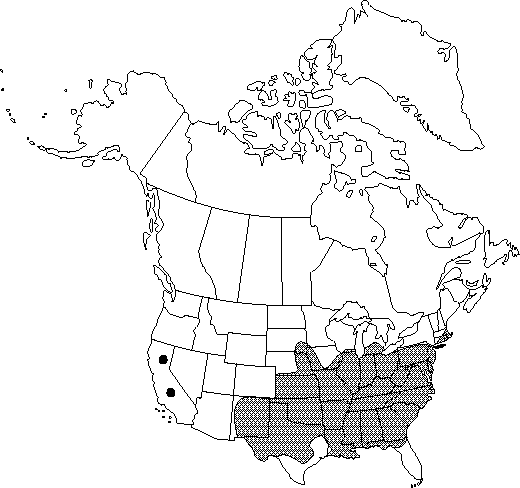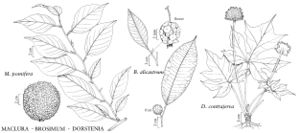Maclura pomifera
Ill. Handb. Laubholzk. 1: 806. 1906.
Trees, to 20 m. Bark dark orange-brown, shallowly furrowed, ridges flat, often peeling into long, thin strips. Branchlets greenish yellow, becoming orange-brown; thorns stout, straight, to 1.5 cm, usually lateral to spur branch, spur branches often paired. Buds often paired, larger one red-brown, globose, 1.5-2 mm; scales ciliate; leaf scars half round, bundle scars arranged in oval. Leaves: stipules lanceolate, 1.5-2 mm, pubescent and long-ciliate; petiole 1-2.5 cm, pubescent. Leaf blade 4-12 × 2-6 cm, base rounded, apex acuminate; surfaces abaxially pale, glabrate, midrib and veins pubescent, adaxially lustrous, glabrous, midrib somewhat pubescent. Staminate inflorescences clustered on lateral spur branches; peduncle 1-1.5 cm, pubescent; heads globose or cylindric, 1.3-2.3 cm; pedicels 2-10 mm, glabrate. Pistillate inflorescences: peduncle 2-2.5 mm, glabrous or pubescent; heads globose, sessile on obconic receptacle, to 1.5 cm diam. Staminate flowers: sepals distinct, yellow-green, ca. 1 mm, apex acute, pubescent; filaments ca. 2 mm, closely appressed to sepals, flattened. Pistillate flowers: sepals green, obovate, 3 mm, enclosing and closely appressed to ovary, hoodlike, ciliate near tip; ovary ovoid, compressed, ca. 1 mm; style base green, ca. 3 mm, branches 4-6 mm, glabrous; stigma yellowish, papillose. Syncarps yellow-green to green, spheric, surface irregular, exuding milky sap when broken, peduncle short, glabrous or pubescent; achenes completely covered by accescent, thickened calyx lobes and deeply embedded in receptacle. Seeds cream colored, oval to oblong, 8-12 × 5-6 mm, base truncate or rounded with 1-3 minute points, margins with narrow groove, apex rounded, mucronate; surfaces minutely striated or pitted.
Phenology: Flowering spring.
Habitat: Thickets
Elevation: 0-1500 m
Distribution

Ala., Ark., Conn., Del., D.C., Fla., Ga., Ill., Ind., Iowa, Kans., Ky., La., Md., Mass., Mich., Miss., Mo., Nebr., N.J., N.Mex., N.Y., N.C., Ohio, Okla., Pa., R.I., S.C., S.Dak., Tenn., Tex., Va., W.Va., Wis.
Discussion
Maclura pomifera is native to southwestern Arkansas, southeastern Oklahoma, and Texas; it is introduced and naturalized elsewhere in the United States. Collections in California, Connecticut, Massachusetts, Rhode Island, and Washington appear to represent isolated escapes.
Maclura pomifera has been widely used in fencerows on farms and along roadways in the midwest and eastern states as windbreaks and wildlife shelter.
The Comanches used Maclura pomifera as an eye medication (D. E. Moerman 1986).
Selected References
None.
